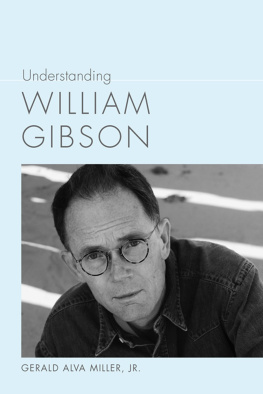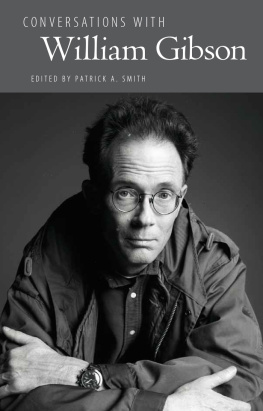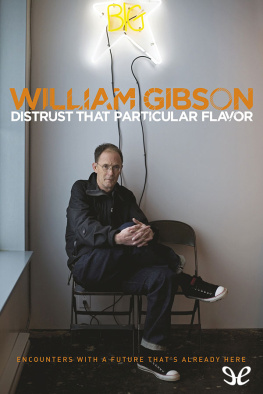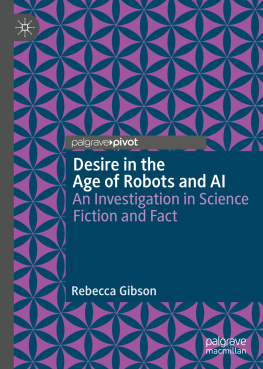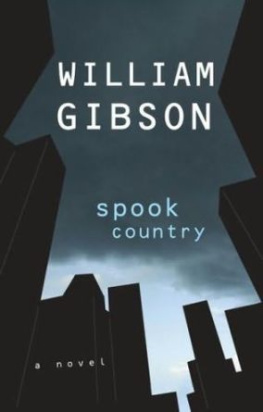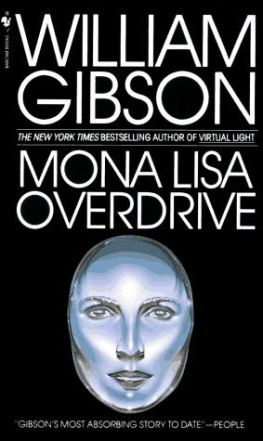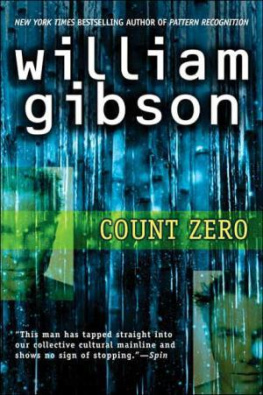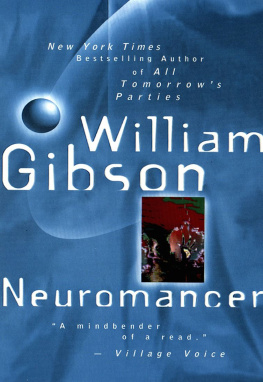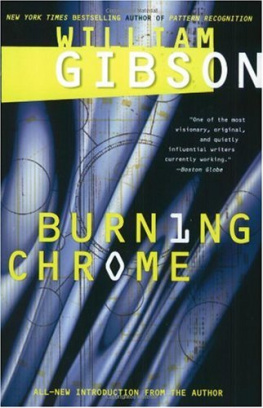
UNDERSTANDING WILLIAM GIBSON
UNDERSTANDING CONTEMPORARY AMERICAN LITERATURE
Matthew J. Bruccoli, Founding Editor
Linda Wagner-Martin, Series Editor
Volumes on
Edward Albee | Sherman Alexie | Nelson Algren | Paul Auster
Nicholson Baker | John Barth | Donald Barthelme | The Beats
Thomas Berger | The Black Mountain Poets | Robert Bly | T. C. Boyle
Truman Capote | Raymond Carver | Michael Chabon | Fred Chappell
Chicano Literature | Contemporary American Drama
Contemporary American Horror Fiction
Contemporary American Literary Theory
Contemporary American Science Fiction, 19261970
Contemporary American Science Fiction, 19702000
Contemporary Chicana Literature | Robert Coover | Philip K. Dick | James Dickey
E. L. Doctorow | Rita Dove | Don DeLillo | Dave Eggers | John Gardner
George Garrett | Tim Gautreaux | William Gibson | John Hawkes | Joseph Heller
Lillian Hellman | Beth Henley | James Leo Herlihy | David Henry Hwang
John Irving | Randall Jarrell | Charles Johnson | Diane Johnson | Adrienne Kennedy
William Kennedy | Jack Kerouac | Jamaica Kincaid | Etheridge Knight
Tony Kushner | Ursula K. Le Guin | Jonathan Letham | Denise Levertov
Bernard Malamud | David Mamet | Bobbie Ann Mason | Colum McCann
Cormac McCarthy | Jill McCorkle | Carson McCullers | W. S. Merwin
Arthur Miller | Steven Millhauser | Lorrie Moore | Toni Morrisons Fiction
Vladimir Nabokov | Gloria Naylor | Joyce Carol Oates | Tim OBrien
Flannery OConnor | Cynthia Ozick | Suzan-Lori Parks | Walker Percy
Katherine Anne Porter | Richard Powers | Reynolds Price | Annie Proulx
Thomas Pynchon | Theodore Roethke | Philip Roth | Richard Russo | May Sarton
Hubert Selby, Jr. | Mary Lee Settle | Sam Shepard | Neil Simon | Isaac Bashevis Singer
Jane Smiley | Gary Snyder | William Stafford | Robert Stone | Anne Tyler
Gerald Vizenor | Kurt Vonnegut | David Foster Wallace | Robert Penn Warren
James Welch | Eudora Welty | Colson Whitehead | Tennessee Williams
August Wilson | Charles Wright
UNDERSTANDING
WILLIAM GIBSON
Gerald Alva Miller, Jr.

The University of South Carolina Press
2016 University of South Carolina
Published by the University of South Carolina Press
Columbia, South Carolina 29208
www.sc.edu/uscpress
25 24 23 22 21 20 19 18 17 16
10 9 8 7 6 5 4 3 2 1
Library of Congress Cataloging-in-Publication Data
can be found at http://catalog.loc.gov/
ISBN 978-1-61117-633-9 (cloth)
ISBN 978-1-61117-634-6 (ebook)
Front cover photograph by Ulf Andersen
http://ulfandersen.photoshelter.com
To the memory of my father, Jerry Miller,
Who taught me to love science fiction.
For my mother, Debbie Miller,
Who has always supported me no matter what.
For Jane, my daughter,
Who has brought new inspiration into my life.
And, finally, for Leigh,
Without whom none of this would have been possible.
CONTENTS
Chapter 1
Understanding William Gibson
Chapter 2
A Cyborg Apprenticeship: The Early Stories and the Retrofitting of Genres
Chapter 3
Beneath the Televisual Sky: The Sprawl Trilogy and the Rise of Cyberpunk
Chapter 4
Nodal Points: Singularities, Heterotopias, and Organic Spaces in the Bridge Trilogy
Chapter 5
Twenty-First-Century Singularities: The Futures End in Gibsons Bigend Trilogy
Chapter 6
Engaging with Difference: William Gibsons Genre and Media Explorations
Conclusion:
Retrofitting CyberpunkGibsons Lasting Influence
SERIES EDITORS PREFACE
The Understanding Contemporary American Literature series was founded by the estimable Matthew J. Bruccoli (19312008), who envisioned these volumes as guides or companions for students as well as good nonacademic readers, a legacy that will continue as new volumes are developed to fill in gaps among the nearly one hundred series volumes published to date and to embrace a host of new writers only now making their marks on our literature.
As Professor Bruccoli explained in his preface to the volumes he edited, because much influential contemporary literature makes special demands, the word understanding in the titles was chosen deliberately. Many willing readers lack an adequate understanding of how contemporary literature works; that is, of what the author is attempting to express and the means by which it is conveyed. Aimed at fostering this understanding of good literature and good writers, the criticism and analysis in the series provide instruction in how to read certain contemporary writersexplicating their material, language, structures, themes, and perspectives and facilitate a more profitable experience of the works under discussion.
In the twenty-first century Professor Bruccolis prescience gives us an avenue to publish expert critiques of significant contemporary American writing. The series continues to map the literary landscape and to provide both instruction and enjoyment. Future volumes will seek to introduce new voices alongside canonized favorites, to chronicle the changing literature of our times, and to remain, as Professor Bruccoli conceived, contemporary in the best sense of the word.
Linda Wagner-Martin, Series Editor
ABBREVIATIONS
Works by William Gibson
BC | Burning Chrome |
CZ | Count Zero |
DTPF | Distrust That Particular Flavor |
N | Neuromancer |
PR | Pattern Recognition |
Other Frequently Cited Works
WGLC | Tom Henthornes William Gibson: A Literary Companion |
WGO | Lance Olsens William Gibson |
WGW | Gary Westfahls William Gibson |
CHAPTER 1
Understanding William Gibson
Born on March 17, 1948, William Ford Gibson is often given the moniker father of cyberpunk, the subgenre of science fiction (or sci-fi or SF) that focuses on computer information systems, corporate control, and hyperurbanized spaces. Ironically, Gibsons early years were not spent in an urban environment or in an area known for technological advancement. Born in the coastal town of Conway, South Carolina, he spent the bulk of his childhood in Wytheville, a small Virginia town in the Appalachian Mountains (Dellinger 1). As Andrew Ross and Scott Bukatman discuss, many of the major cyberpunk authors also hailed unexpectedly from southern locales instead of from the major northern cities one might expect. Bruce Sterling, John Shirley, and Rudy Rucker, for example, were born in Brownsville, Texas; Houston, Texas; and Louisville, Kentucky, respectively. Despite his rural upbringing, Gibson became a dual citizen of Canada and the United States and a critic and visionary of the digital age.
From the Rural to the Virtual: A Brief Chronology of Gibsons Life
Gibson spent his first eight years in various parts of the South. His father, William Ford Gibson, Jr., managed a construction company that did plumbing work at Oak Ridge, where the first atomic bomb was built (Feller). Gibsons father died when the boy was eight, after which he and his mother, Elizabeth Otey, moved back to her hometown of Wytheville, Virginia (Feller). Because his mother was the town librarian, Gibson developed an early passion for books, and his writing style was influenced equally by sources as diverse as hard-boiled crime authors such as Raymond Chandler and postmodern novelists such as Thomas Pynchon (Dellinger 1). But it was the Classics Illustrated comic book version of
Next page
